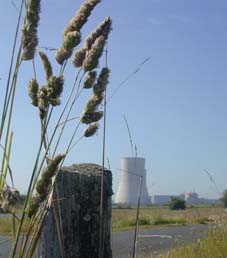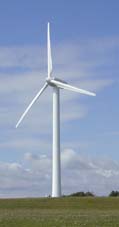|

|
EFN -
NEWS
Newsletter of EFN -
Environmentalists For Nuclear Energy
March
23rd, 2006
|
The fire at Oi nuclear plant
in Japan causes no victims but is widely reported in the
media
This newsletter is archived
and made available to the public on the website of EFN:
http://www.ecolo.org/archives/archives-nuc-en/
Dear friends of clean energy,
A fire occurred at the Oi nuclear power plant in
the Fukui Prefecture in Japan yesterday, wednesday 22 March
2006.
The Oi (sometimes spelled Ohi) nuclear power plant
has four pressurized water reactors of 1120 MW net output
each.
 The
Oi nuclear power plant is located about 380 kilometers (236 miles)
west of Tokyo.
The
Oi nuclear power plant is located about 380 kilometers (236 miles)
west of Tokyo.
Oi-1 and Oi-2 were connected to
the grid in 1977 and 1978. Oi-3 and Oi-4 were connected to the grid
in 1991 and 1992.
The fire happened outside the reactor containment,
in a building between the reactors number 3 and 4. This building is a
low-level waste-incinerating facility.
The fire started at about 9.40am GMT (6:40 pm
Japanese time on wednesday).
It took the firemen with protective clothing about
two hours to reach the exact location of the fire and then a few more
hours to extinguish the fire, because of the smoke which made it
difficult to approach the fire.
Two of the workers of the incineration facility
have inhaled some smoke and were taken to a hospital for medical
surveyance and treatment. Their lives are not in danger, and they are
not seriously injured. A third worker was also evacuated from the
site but was not injured at all. Other personnel at the plant
remained at their work stations and the four reactors continued to
operate, unaffected by the fire in the incineration building which is
not directly related to the electricity production.
No radioactivity was released in the environment
(and only very low and harmless levels of radiation, if any at all,
was released inside the incineration building).
The overcoats, overboots, gloves of workers and
other similar items usually incinerated in this low-level waste
incineration facility contain only low levels of radiation
(comparable to natural levels of radioactivity that can be
encountered in nature) and therefore such levels of radiation are not
dangerous even if there was a small release of radiation inside or
outside the building.
See more details about this story at:
http://abcnews.go.com/International/wireStory?id=1754946
http://www.mg.co.za/articlepage.aspx?area=/breaking_news/breaking_news__international_news/&articleid=267400
http://www.freenewmexican.com/news/41167.html
If a similar fire had happened anywhere else than
in a nuclear plant, no one on the other side of the planet, outside
the Fukui prefecture, would have ever heard about this story in the
press.
In short: a small fire in a room, two workers
inhale some smoke before they leave the room, the fire is
extinguished without much harm by the local firemen (although it did
take them a few hours to do so), no one has died nor was seriously
injured. Two workers have inhaled some smoke but their lives are not
at risk. And at no moment has there been any danger for the safety of
the reactor or concerning the used nuclear fuel stored in a distinct
nearby building.
__
A few comments come to my mind when seeing this
story in the news:
A nuclear event is a perfect story for the news
media and press agencies: you can sell the story all around the world
even if (almost) nothing happened, transforming minor incidents,
which of course happen once in a while even in the nuclear industry
(although much less often than anywhere else), into a major news
story.
The very fact that news of such an accident
reaches us all the way from Japan, shows how quickly the information
is forwarded when it comes to nuclear subjects.
This is, in fact, a good thing, rather reassuring,
and shows to what extent the nuclear industry is transparent. The
information isn't hidden and even incidents and minor accidents are
communicated worldwide.
Although this event looks more like a minor
industrial incident than a major accident (no radioactivity was
dispersed in the environment, no one died or even was seriously
injured), it will probably erode a bit more the public confidence in
nuclear energy in Japan (and around the world).
There's still lot's of work to be done to put
these stories in a broader perspective, comparing them to the
situation in other industries, and to inform the public completely
about the much greater dangers of the alternatives (especially coal
and gas) !
Incidents or small accidents such as this one at
Oi in Japan do happen about once a year in the nuclear industry
somewhere in the world.
Each of them, because the world "nuclear" is
mentioned, becomes a major story on TV and in the news.
However it should be noted that on the same day as
this small fire who killed nobody occurred in Japan, several dozen
coal miners including some children DIED in coal mines, many of them
in China, but also in Central and Southern America, the Russian
Federation, Eastern Europe... but these DEATHS (not just minor
injuries) are usually unreported in the media.
It should be noticed that such DEATHS in coal
mines happen not once a year, but EVERY DAY (maybe that's the reason
it's not as interesting for the media?) in various locations around
the world.
The numbers show clearly that the main problem in
this regard (and the main cause of the continuation of frequent
deadly accidents in the energy sector) is not the safety of nuclear
plants, it's how the media can influence public policies and energy
choices with distorted news, amplifying some incidents in the nuclear
industry, while not reporting in the same manner the casualties
happening every day in the coal industry.
The unsafe and dangerous coal industry could
however be easily replaced by the certainly imperfect (nobody's
perfect) but nevertheless much, much, much, much safer and cleaner
nuclear industry.
But the pressure exercized on the public opinion
and on the politicians by anti-nuclear ideologists and by one-sided,
amplified and distorted news stories such as this one, makes nuclear
energy (unrightly so) appear as unacceptable in people's (and
politician's) minds, and therefore the coal industry continues to
kill many dozens of workers each day, and no one really cares about
that, because it's hardly reported at all in the news.
Here's a recent example: 17 people died just a few
days ago on March 13th (and many more since then) at the Rongcheng
coal mine in China. Had you heard about that one?
http://news.monstersandcritics.com/asiapacific/article_1136632.php/17_dead_five_missing_in_gas_explosion_at_China_coal_mine
Similar accidents occur almost every day somewhere in the
world.
As you can see in this case, a coal accident
killing 17 coal workers is echoed in the press (when it happens to be
reported, because in most cases it isn't reported at all) by a much
shorter article than a "nuclear" event without any victims and
without any risk as regards the safety of the reactor.
Nuclear energy could in fact very efficiently
prevent these many deaths in coal mines, if the real picture and if
ALL incidents and accidents (not just the ones in the nuclear
industry) were correctly reported to the public.
Dozens of people continue dying each day because
of our inability of comparing risks.
This is the current situation, but what about the
future?
What will happen when we will run out of oil in
very few years from now, if we don't develop nuclear
energy?
It might then be not just dozens of victims, but
perhaps thousands of casualties each day, not only in Japan, but all
around the world, resulting from the return of poverty, lack of
heating in winter, and food shortages, especially in regions such as
Japan and Western Europe who have little or no domestic energy
resources available.
Remember what life and civilization were like
before oil permitted the development of our modern civilization.
Having no energy at all (or too little) kills much more than the
burning of coal, and even more so than a safe and clean energy source
such as nuclear energy.
Of course, we should always remain vigilant to
prevent and limit the consequences of any accidents and the lessons
can and must be learned, and the procedures improved from this event
at Oi in Japan.
The causes of the Oi fire must be understood in
order to prevent this from happening again. In this case it seems to
me that the causes of the fire should be understood to improve the
incineration procedures and/or equipment and to prevent the
repetition of a similar fire. In some countries, the slightly
contaminated protective clothings are not incinerated and burnt into
ashes, but just compacted by a mechanical press into drums. The
fire-fighting procedures and the training of fire-fighters might also
be improved. Several hours to approach a minor fire, and several more
hours to extinguish it seems to be a rather long time. This delay
could perhaps be improved with more efficient fire-fighting
equipments and/or better training of personnel. It can also be
observed however, that in order to protect the lives of fire-fighters
and avoid taking unecessary risks, it is also necessary, if the fire
poses no immediate danger, to take some time to think and organize
before intervening.
In any case, the lessons should be learned, and
the procedures improved, but at the same time the relatively limited
consequences of the Oi fire also reminds us how safe the nuclear
industry is, compared to the daily casualties in coal mines, gas
explosions and other industries.
Yours sincerely, with kindest
ecological regards,
Bruno Comby.
President of EFN
Environmentalists For Nuclear Energy

http://www.ecolo.org
EFN - For complete and
straightforward information on energy and the
environment
To subscribe (or unsubscribe) to EFN's mailing list, go to EFN's
web site: http://www.ecolo.org
and click on "mailing list".
You may, with their approval, freely subscribe to the mailing list
all those among your friends who would like to be informed about
energy, the environment, and EFN's activities. To do this, just type
their e-mail address above, and click the "Subscribe" button (with
their approval).
To subscribe to our mailing list, the only condition is to share
our point of view and to type in your e-mail in the box above. You
will then be informed automatically of EFN's activities. This
subscription is entirely GRATIS. EFN is a not-for-profit
organization. It does not place any commercial advertisements on it's
web site, and does not sell it's mailing lists to anybody. To help
EFN continue its activities, inform the public, and maintain this
FREE service, you can subscribe
or make
a donation (in Euros). Your donations to EFN-FRANCE and EFN-USA
give right to a tax-credit in France and are 501(c)3 tax deductible
in the USA (donation to not-for-profit organizations).
For subscriptions and donations intended for EFN-International:
click
here (EFN-International is an international not-for-profit
organization).
For subscriptions and donations in US $ intended for EFN-USA:
click
here (EFN-USA is a 501(c)(3) tax-exempt not-for-profit
corporation incorporated in the State of Delaware).
For subscriptions and donations in CAN $ intended for EFN-CANADA:
click
here (EFN-CANADA is a federally incorporated not-for-profit
Canadian organization).
For subscriptions and donations in EUROS intended for EFN-FRANCE:
click
here (EFN-FRANCE is a French not-for-profit association).
For subscriptions and donations in YENS intended for EFN-JAPAN:
click
here (EFN-JAPAN is the Japanese branch of EFN's activities).
To become a local correspondent of EFN in your country: local
correspondents
To develop a local branch of EFN in your country, please contact
us by e-mail.
©
EFN, all rights reserved - Unless
specifically mentioned otherwise, reproduction, use or distribution
of these information, texts or images, without EFN's prior written
approval, is forbidden

 The
Oi nuclear power plant is located about 380 kilometers (236 miles)
west of Tokyo.
The
Oi nuclear power plant is located about 380 kilometers (236 miles)
west of Tokyo. 
